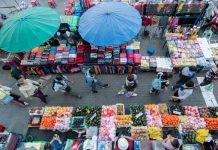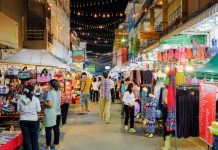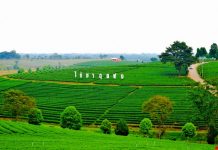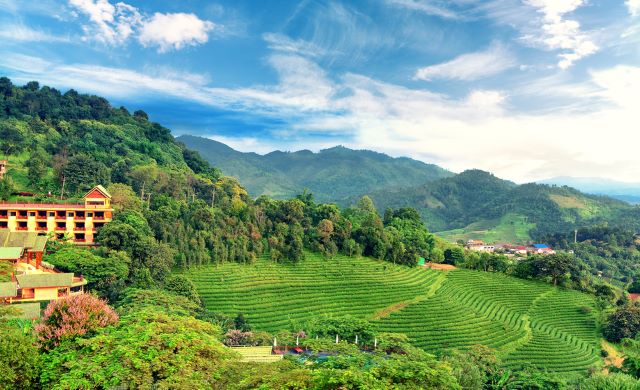
Doi Mae Salong, land of tea, gentle fog, and lovely mountain
Doi Mae Salong or Mae Salong Peak is another famous mountain attraction in Chiang Rai. The picturesque landscape that you can see the beautiful Wild Himalayan Cherry blossom all along both sides of the way up to the top of the hill in the winter. The place attracts the numerous tourists of both local and from the overseas to check-in here. Just like a daydream, the moment that we stand and indulge in the stunning scenery of nature and the gentle cold breeze to touch our face. So-called the location makes us feel like the countryside in China unsurprisingly was the venue that Chin Haw the Chinese that immigrated to Thailand formerly lived in Yunnan settled down. Chin Haw lives the life with agriculture which is tea plantation and winter climate vegetable farming. And the notable tea productivity which is very famous widely is “Oolong Tea”. More than that, Doi Mae Salong is diffused with the Chinese tradition and culture that we can see from the costume or eating. Specifically, the food that is remarkable delicious – Yunnan Stewed Pork Ham that served in a big plate and Mantou (Chinese steamed bun) is a perfect combination to complete this delectable signature menu of Doi Mae Salong.
Knowing Doi Mae Salong
Doi Mae Salong home of Santikhiri Village situated in Mae Salong Nok sub-district, Mae Fa Luang district, Chiang Rai. The location is a community of the migrator from the Republic of China Army’s 93rd Division in Myanmar that divided into 2 groups. The first group which is the 3rd Battalion settled down at Fang district in Chiang Mai. While the second one the 5th Battalion nestled at the village of Mae Salong Nok in Chiang Rai. Doi Mae Salong, presently, is renowned as the famous landmark for the tourist to visit in Chiang Rai and also it is the best venue of tea plantation of the country, too. The peak season of Doi Mae Salong that lures lots of travelers is when the Wild Himalayan Cherry or better called locally “Siamese Sakura Blossom” flowers all over the hill is between the early of January until the end of March.
The climate of Doi Mae Salong
Benefits for the tourist as Doi Mae Salong is pleasant climate all year round so whether you visit the place in the winter to see the Cherry Blossom and touch the cold breeze or explore this lovely mountain in the rainy season to feel the sea of fog and in love to the beautiful greenish landscape would be worthwhile for you to make a trip. Yet, the average temperature of Doi Mae Salong is between 15 – 20 degrees Celsius. The coldest period is during December – January that the temperature drops to 4 – 6 degrees Celsius at nighttime. While the hottest time is in April with the temperature is 25 – 32 degrees Celsius in estimate in the daytime. And between June – November is the most pleasant climate time of Doi Mae Salong with the temperature about 15 – 20 degrees Celsius.
The high season of Doi Mae Salong is in winter between November – January with the cold weather and beautiful landscape.
Highlight Events at Doi Mae Salong
There are traditional event and festival in Doi Mae Salong that anyone who would like to experience the unique and exotic way of life and culture of the locals in Mae Salong should take a chance to check-in. And the highlight activities including;
- Cherry Blossom Festival: Between January – February.
- The Ethnic Group New Year Festival: The event sets up during the end of the year annually.
- Chinese New Year: In February
- Tea Festival at Doi Mae Salong: The event scheduled during the end of December – the beginning of January.
The Must-to-Do & Attractions in Doi Mae Salong
1. The Martyrs’ Memorial
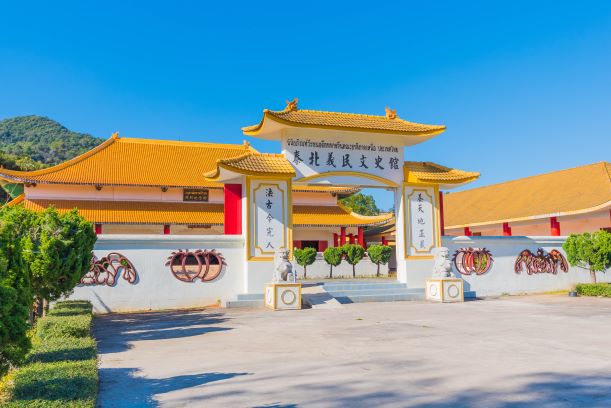
A memorial to remind that the village of Santikhiri was home of the Kuomintang (KMT) soldiers who died in their fight against communism within the area of Doi Luang, Doi Khao, and Doi Pha Mon in Chiang Rai province during 1971 – 1985, and at Khao Ya terrain in Phetchabun province in 1981. The vast number of KMT soldiers sacrificed the life and seriously injured from those of battlefields. Therefore, the Thai government at that time on behalf of HM King Bhumiphol esteemed those soldiers as the person who makes benevolence to Thailand and gave permission for them to naturalize to Thai. Consequently, they were very grateful and appreciative to the gracious kindness of the late King Rama IX.
The Martyrs’ Memorial was designed and built magnificently in Chinese style, the interior is a museum collected the information and background of the community of Mae Salong, the history of the KMT and its effort and devotion, the settlement in Thailand. Also, there is a library to store all valuable proof and evidence for the new generation and interesting people to learn. And the exhibition to show the photography of the background and essential objects on Doi Mae Salong in the past. The venue opens to the visitors every day between 8.00am – 5.00pm with the admission fee is THB20 for Thai and THB50 for the foreigners.
2. Phra Boromathat Chedi Srinagarindra Sathitmahasantikhiri
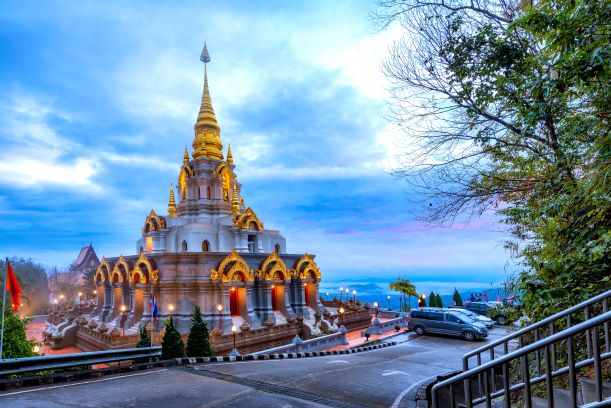
The significant pagoda stands loftily over the summit of Doi Mae Salong with about 1,500 meters above the sea level. About 4 km from the village of Santikhiri, Phra Boromathat Chedi Srinagarindra Sathitmahasantikhiri is easy to reach for the devotees and the tourist on the excellent condition pavement. The significant pagoda was completed for construction in 1996 to dedicate to HRH Princess Srinagarindra, the Princess Mother. The holy structure is contemporary Lanna art on the square-shaped platform in descending order. The 30-meter high chedi is approximately 15 meters wide for each side and ornamented with the grey porcelain. There are three arches in each front of the pagoda and in four directions of the stupa are the standing Buddha. The bell-shaped part is gilded with the gold leaves and engraved decoration. And next to the main pagoda is a Lanna contemporary sermon hall. The location to enshrine the grand pagoda is at the top of Doi Mae Salong, undoubtedly it is the best spot to see the picturesque view of this lovely mountain endlessly. It could say that Phra Boromathat Chedi Srinagarindra Sathitmahasantikhiri is an iconic landmark of this mountainous attraction.
3. Phra That Sri Mahabodhi Mongkolboonchum
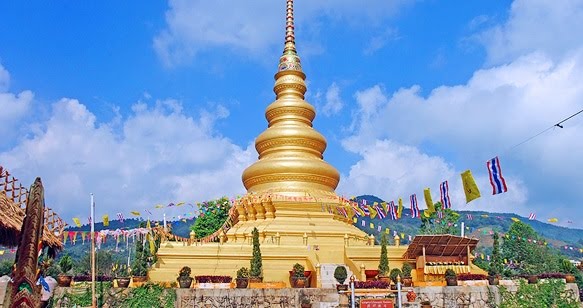
Another notable holy site is worshipful among the locals. Phra That Sri Mahabodhi Mongkolboonchum is a grand pagoda that every group of the ethnic minorities in Mae Salong district collaborated with the venerable Buddhist monk Kruba Boonchum built and presented to HM late King Rama IX dated November 5, 2006, in the occasion of 60th Anniversary Celebrations of King Bhumiphol Adulyadej’s Accession and 80th Birthday Anniversary. Inside is a sacred Buddha image which is very esteemed among the local residents.
4. General Tuan Shi-wen Cemetery
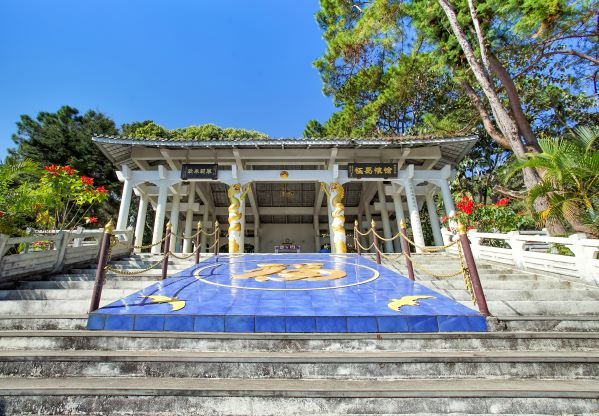
A pagoda-like tomb on a hilltop was built to be the monument for the offspring of the KMT learn about the history, importance, and the benefaction of General Tuan Shi-wen the leader of the group of soldiers who evacuated from Yunnan. The general has the name in Thai is Shiwan Khamlue. At the front of the tomb is a hillside with the Chinese alphabet ‘Tuan’ in gold on the blue background.
The location is considered as a potential strategic area that is about 1,300 meters hill providing the perfect panoramic view of the village apparently. It said that General Tuan chose this property by himself when he was lived. There’s some story mentioned about the statement of the general that ‘the reason that I chose this land since the village of Santikhiri is cuddled by this valley. So, as if one day that I am no longer here this place will be just like my arms and my back to save my offspring and the residents of this village from any harms forever”.
5. Taste the Finest Oolong Tea and Wandering in the tea plantation at Doi Mae Salong
Mentioned to the trip to Doi Mae Salong, a must-not-miss for any tourist who visits the place is tasting the finest tea including to spectate the traditional Chin Haw tea making. Especially in the winter season would be the perfect time to taste the tea, dreamingly to sip a hot Oolong tea in the mild cold climate while you are watching the cherry blossom falls down from the tree. We think it would be one of the best moments ever for your trip, indeed.
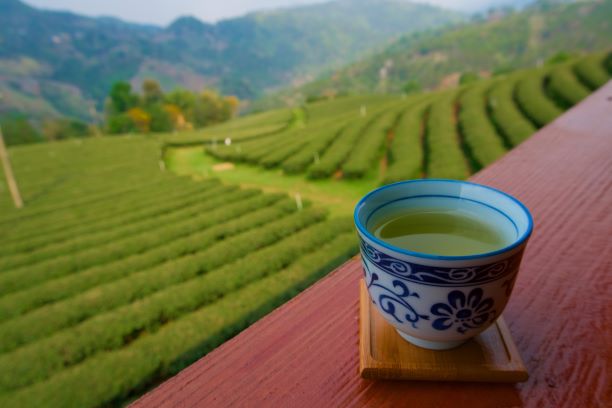
In fact, tea is a commercial crop of the village of Santikhiri that there are up to thousands rai of the tea plantation with more than 2 million tea plants within the area. Unsurprisingly, Santikhiri Village is a full-scale tea manufacturer including the tea plantation, tea processing house, and lots of tea shops line along the main road in the village. Nevertheless, the most famous tea of Doi Mae Salong is Oolong Tea with its distinctive aroma and the specific drinking according to the Yunnanese. Every tea shop such as Tea Plantation 101, Wang Put Tan Tea, General Tuan Tea House, etc. are more than welcome to the tourist to taste the tea for free, get a bit of advice for the tea making, how to select the tea, and utensils. Besides, the visitors can watch the tea plantation and tea picking, as well.
5.1 Tea Plantation 101
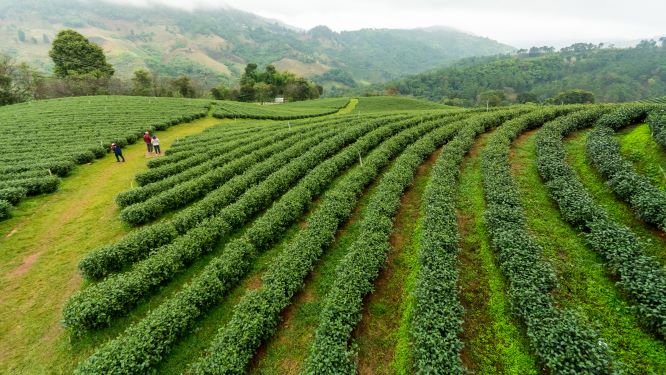
The remarkable tea plantation guaranteed with the award-winning 1st place Quality Oolong Tea No.12 and No.17 at world tea festival. Since you enter the farm, you will spot the lovely landscape of the terrace style tea plantation and the rolling mountain range as the perfect background by nature creating the magnificent heaven-like panorama. The Tea Plantation 101 opens to the visitors daily between 7.00am – 5.00pm.
5.2 Wang Put Tan Tea
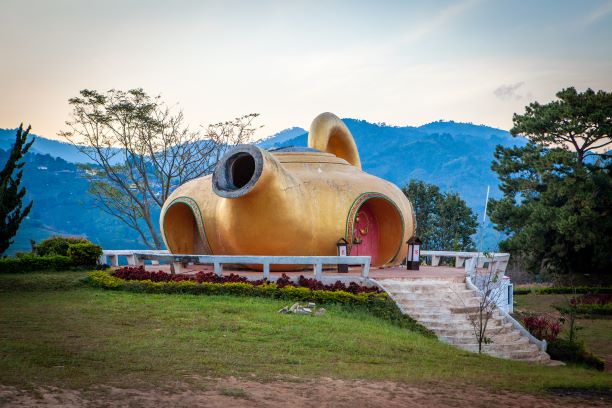
The tea attraction is prominent with the figures of golden lion and silver lion at the entrance. Moreover, the massive sculptures of three teapot line orderly on the hill are another popular signature of Wang Put Tan Tea Plantation that any visitors would not skip snapping some pictures. Day by day, there are the numbers of tourists both Thai and foreigners come to this tea plantation to enjoy the beautiful scenery and iconic landmarks at the place.
6. Watching the Siamese Cherry Blossom
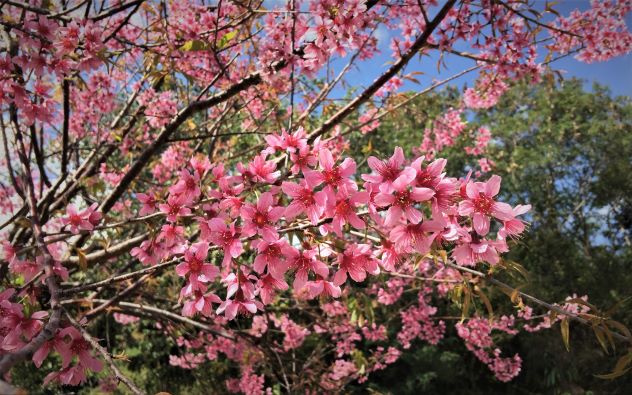
Along the ways head to the village of Santikhiri both Kew Satai and Ban I-Ko Trisection are filled with the Wild Himalayan Cherry Trees along both sides of the road with more than 4 km in its length. When the time is coming, leaves on the cherry trees will fall down, and only the blooming pink flowers look similar to the Japanese Blossom resulted in the fabulous scene that any tourist would fall for. The Wild Himalayan Cherry or so-called locally is “Siamese Cherry Blossom” or “Siamese Sakura” is a native plant in the highland in the north of Thailand. And the Wild Himalayan Cherry in Doi Mae Salong was planted in 1982. The best period to see the cherry blossom is between December – February.
About Siamese Sakura
The Wild Himalayan Cherry (Prunus cerasoldes D. Don) is grouped in the species of Rosaceae which is the same family of rose, plum, Chinese plum, Sakura, and more. The Wild Himalayan Cherry’s flower is similar to Sakura that’s why it called as “Siamese Sakura”. The tree grows in the high mountains with up to 1,000 – 2,000 meters from the sea level in particular in the north of Thailand.
Experience the exotic tradition and culture of the people at Doi Mae Salong at The Tea Festival
The Tea Festival at Doi Mae Salong organizes during December 28 to January 4 annually at the area of The Martyrs’ Memorial in the village of Santikhiri (Doi Mae Salong), Mae Salong Nok sub-district, Mae Fa Luang district, Chiang Rai in order to promote the local tourism.
At the fair, there are exhibition, trading the finest tea leaves, shows of the traditional ethnic group, cooking contest including traditional ethnic minorities food and menu created from tea leaf. Also, the pageant contest, folk song singing contest, and light and sound show regarding the story of the ethnic minorities on Doi Mae Salong in 6 periods. Apart from That, in the night of December 31 which is the New Year’s Eve will be the firework and floating lantern to celebrate the festive season, and offering the alms to the monks in the morning of January 1 that is unique from other location since it is the tea offering to the monks including the northern style tray of food (Khantok) with 9 kinds of auspicious dish.
How to go to Doi Mae Salong
By Car:
There are two directions to Doi Mae Salong which are;
- From Chiang Rai city town drives on the highway number 10 to Mae Chan district at the 29th km. Then, turns left and drives along the road number 1089 (Mae Chan – Tha Ton) at the 856th km burrstone not far from the entrance of Mae Chan city. So, keeps driving through Pa Tueng Hot Spring (78th km), Lan Thong Village (between 73rd – 74th km), and Ban Huay Hin Fon until arrive at the Drugs Checkpoint next to Kew Sa-Tai Trisection at the 55th km burrstone. Then, make the right turn and drives along the road up to the mountain that is a curvy lane about 15 km.
- An old path, on the highway number 10 and passes by Mae Chan district to Mae Sai district until the 860th km burrstone. Then, takes the left fork with the sign to go to Doi Mae Salong which is a narrow and curvy road. This way will pass by the hill tribe villages that stand all along the path intermittently and when arrives at Ban Pa Miang at the 10th km there is The Hill Tribe Development and Foster Center Trisection. So, make the right turn to enter the highway number 1338 to head to Doi Tung Royal Villa, then turns left to the road number 1234 and drives more about 25 km to pass Sam Yaek Ban I-Go at the 9th km. And makes a turn left and moves for more 16 km to Doi Mae Salong.
By The Public Transportation:
To go to Doi Hua Mae Kham
- Gets the green pick-up truck route Mae Chan – Tha Ton in Mae Chan Market and gets off at Kew Satai Checkpoint. Then, gets the pick-up truck from Kew Satai to Mae Salong that the traveler should be prepared since the car is blow hot and cold for the departure time. Anyhow, the car will come to pick up the passenger intermittently; otherwise the traveler also can hitchhike.
The blue pick-up truck route Pa Sang – Mae Salong is available at Ban Pa Sang which departs from the venue between 7.00am – 4.00pm. The price for round trip charter is THB800 or THB60 – THB100 per person. And the tourist can get the truck back from Mae Salong that parks at the 7-11 shop.

